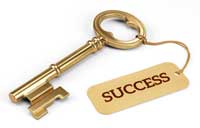My dad recounts a story from his early days as a salesman. One of his competitors showed up for a sales call at the purchasing agent’s office. He started the call by asking the purchasing agent “How are we doing?” The buyer reached into his pocket, took out a dime, flipped it to the salesman and replied “Why don’t you go down to the pay phone in the lobby and call your office and find out. When you know the answer come back up and see me and you can tell me….”
Had the salesman taken the time to check the status of the account prior to his visit, he would have known that his company had been chronically late on their deliveries and were currently past due on several items. The purchasing agent was expecting the salesman to show up with explanations, solutions and resolutions to the delivery issues.
It never has been professional to show up at a sales call uninformed and unprepared. But, in today’s world it is magnified even more so. Purchasing personnel are stretched thin as it is since their companies have added more responsibilities to their positions. Many are reluctant to even schedule appointments with a salesperson unless it is critical and/or urgent. So, when a salesperson does get an audience with the customer, he needs to make the most of the time allotted. Preparation is the key to ensuring that will happen.
Checking in with the office has gone way beyond calling in for a brief update from a pay phone. We have been given a multitude of tools that allow us to prepare for a very professional call. Many of the appointments I now make with a customer do not even get scheduled with an actual conversation. They are scheduled with a couple of traded voice mails, e-mails and an electronic invite.
When trying to get an appointment scheduled with an existing account, I include the following:
- Primary reason for the meeting.
- Who will be joining me for the visit.
- Who I would like them to include on the visit.
- Dates and time frames I would like to schedule.
- Additional items I would like to include on the agenda.
- Additional items they might like to include on the agenda.
Once all of the above information has been secured, I will send an electronic meeting Invite to all personnel who are to attend the meeting, along with the agenda.
Prior to making the actual call, I will try to prepare as much as I can to make it an effective call and use the time available as efficiently as possible. I will check past and current status via phone and/or e-mail with key personnel assigned to managing the account, such as inside sales, customer service, planner/schedulers (both principal and customer), etc. It is also prudent to check for any recent or current quality issues. Many companies now have supplier portals or published supplier performance summaries/ratings. It is critical to know your company’s measured performance rating by the customer. If you are being scored lower than exceptional, find out why and what you need to do to attain the highest rating. Make sure that you understand what aspects of your company’s performance are being measured and how those measurements are weighted. And, make sure the scores given are accurate and fair. Performance evaluations can be a positive tool in demonstrating that your principal is either performing at the highest level or doing the things necessary to get themselves there.
Preparing for a sales call is not just being ready to address issues from the customer’s standpoint. It is also addressing issues that your principal may be experiencing with the customer. Are they paying their invoices based on agreed-upon terms? Are they releasing product in a timely manner? Are they staying within the scheduling windows outlined? Are they giving sufficient lead times to consistently hit targeted deliveries? Are they ordering quantities that are on target with the pricing and EAU’s that were put in place?
When either party is discontented with the other’s performance, it leaves the door open to look elsewhere. A salesperson’s job is to keep that “horse from getting out of the barn.”
Lastly, be cognizant of the customer’s time. Wrap up — if possible — in the time frame allotted. And, once you have gathered your notes — send meeting minutes and assigned action items to both your principal and customer.



